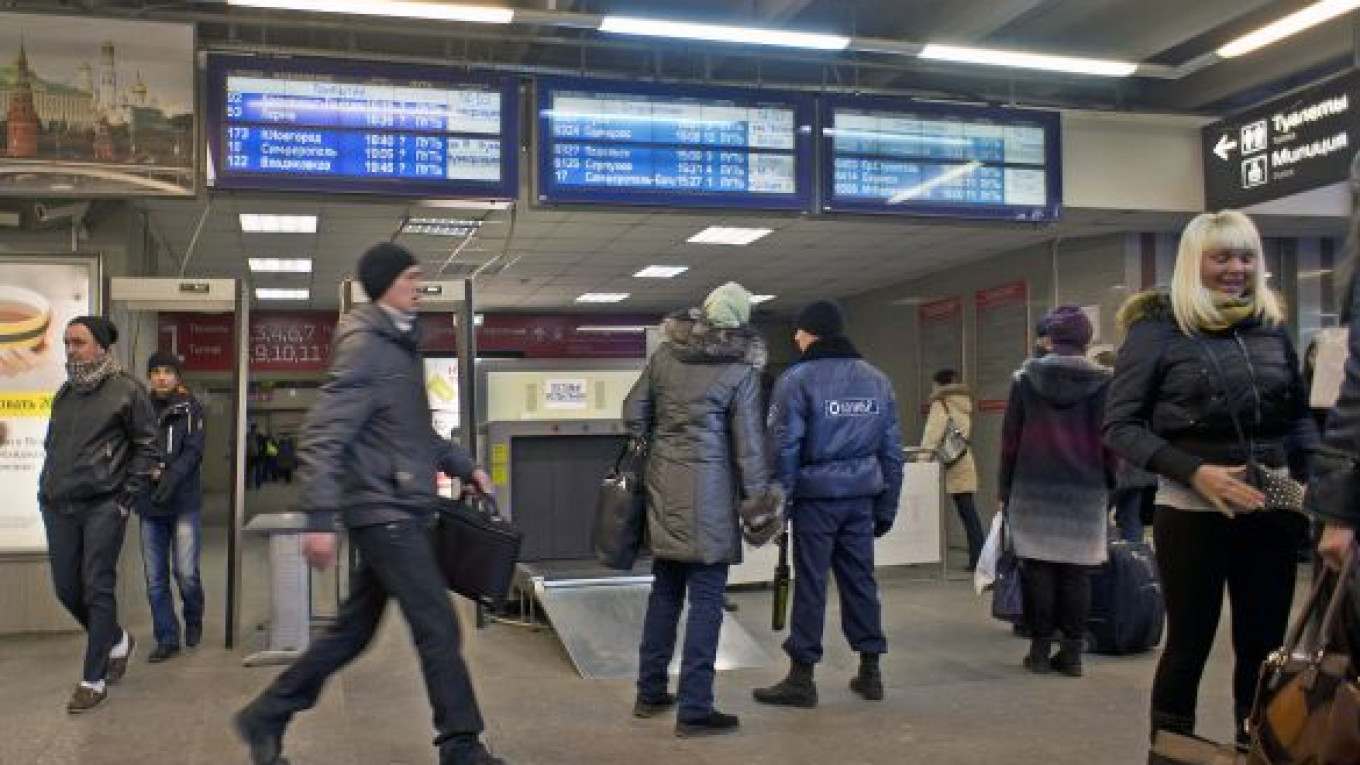As part of an effort to ensure transportation security ahead of the Sochi Olympics next year, Russian Railways on Monday introduced additional security checks at entrances to 32 major train stations across Russia.
The affected stations include those that serve high-speed Sapsan and Allegro trains between Nizhny Novgorod, Moscow, St. Petersburg and Vyborg, as well as major stations in the southern Russian cities Sochi, Adler, Krasnodar and Makhachkala. A handful of stations in the Far East and Volga River regions will also be affected.
The new security system will operate in a trial mode for now and only a “select number of passengers” will have their luggage checked, the Transportation Ministry said in a statement.
President Vladimir Putin has made security one of the government’s top priorities for the Sochi Games, which will be held just a few hundred kilometers from North Caucasus republics with almost daily gun battles between security forces and separatist militants.
The Sports Ministry has drafted a decree that would require all Olympics attendees to undergo a background check with federal security services responsible for safety at the event. After getting security approval, a ticket holder would have to obtain a special registration card, according to a draft document published on the Economic Development Ministry’s website in December.
A final decision on the initiative, dubbed the “Olympic passport,” will be made only after trial competitions that run at least through May, Deputy Prime Minister Dmitry Kozak told Interfax on Friday.
Two experts praised the government’s effort to enhance security on transportation but said it would be important to see how well the initiative was implemented.
“Security is among travelers’ top three concerns,” said Yury Barzykin, vice president of the Union of Travel Industry. “Plus, people have no choice — they must either take a train or fly, so I don’t think passenger traffic will be affected.”
Strict security measures have been introduced on transportation lines and hubs in recent years after terrorists targeted railroads and a Moscow airport with deadly attacks.
The Nevsky Express high-speed train has been blown up twice on its route between Moscow and St. Petersburg, in August 2007 and November 2009. In the 2007 bombing, 30 passengers were injured, while the 2009 explosion killed 27 people.
The Federal Security Service said in August 2011 that it had foiled a group of North Caucasus insurgents planning to bomb a Sapsan train.
Alexei Starichenkov, head of a transportation security lab at the Russian Academy of Sciences, said security measures needed to be comprehensive to ensure safe travel. “If you check people who enter the station, you also have to check railway workers,” he said.
Following the 2009 Nevsky Express attack, the Oktyabrskaya Railway, which operates the Moscow-St. Petersburg line, said it would install surveillance cameras along the whole route by 2011. According to Starichenkov, it is unclear whether the promise was fulfilled.
At a news conference Monday to discuss the changes going into force, Russian Railways official Sergei Abramov said the passenger checks would be voluntary for now, until a bill is passed giving railway employees the authority to conduct the searches. At the moment, if the railway workers judge a search to be mandatory, they can ask police officers to conduct it.
Russian Railways said in a statement that the Interior Ministry and Transportation Ministry are developing the necessary amendments to allow the security checks to be conducted by rail officials.
The government began imposing stricter security measures at various transportation hubs in the wake of an attack on Domodedovo Airport in January 2011, when a suicide bomber detonated himself in the international arrivals hall, killing 37 people.
At the time, then-President Dmitry Medvedev blamed Domodedovo’s management for the loosened security measures that allowed the suicide bomber to enter the airport without screening. Bag screening was subsequently introduced at the entrances to Moscow’s three main airports, Sheremetyevo, Domodedovo and Vnukovo.
In February 2011, Medvedev made a surprise visit to Kievsky Station in central Moscow, where he slammed security failings.
After that trip, metal detectors were installed at all major railway stations across Russia, but until Monday thorough checks and bag screenings were conducted only at special pavilions built at entrances to platforms for high-speed trains.
In Moscow, the new security checks were set to be introduced Monday at the Kursky and Leningradsky Stations.
Contact the author at [email protected]
Related articles:
A Message from The Moscow Times:
Dear readers,
We are facing unprecedented challenges. Russia's Prosecutor General's Office has designated The Moscow Times as an "undesirable" organization, criminalizing our work and putting our staff at risk of prosecution. This follows our earlier unjust labeling as a "foreign agent."
These actions are direct attempts to silence independent journalism in Russia. The authorities claim our work "discredits the decisions of the Russian leadership." We see things differently: we strive to provide accurate, unbiased reporting on Russia.
We, the journalists of The Moscow Times, refuse to be silenced. But to continue our work, we need your help.
Your support, no matter how small, makes a world of difference. If you can, please support us monthly starting from just $2. It's quick to set up, and every contribution makes a significant impact.
By supporting The Moscow Times, you're defending open, independent journalism in the face of repression. Thank you for standing with us.
Remind me later.


